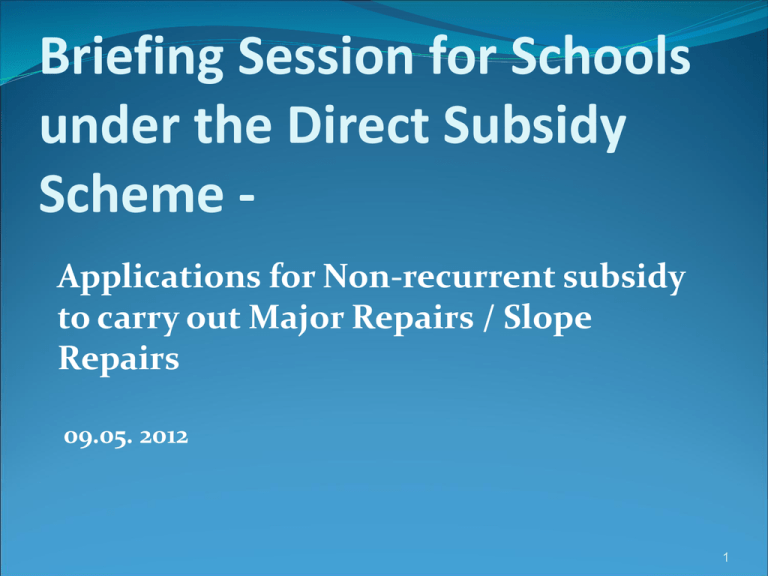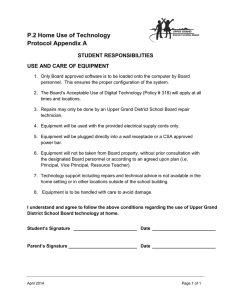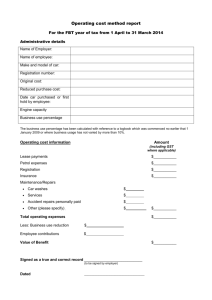申請非經常性資助進行大規模修葺/斜坡修葺工程
advertisement

Briefing Session for Schools under the Direct Subsidy Scheme Applications for Non-recurrent subsidy to carry out Major Repairs / Slope Repairs 09.05. 2012 1 Run-down A. Parties Involved B. Important Points to Note C. Key Procedures D. Other Concerns 2 A. Parties Involved Consultant /AP SCHOOL Contractor owner/occupier works delivery agent Subvented organization EDB project proponent vote controller subventing Bureau Professional adviser to school Familiar with statutory requirements Expert in building construction & maintenance Proper capacity to deal with statutory and/or maintenance proposal submission to authorities ArchSD technical adviser on subvention procedure & subventibility 3 B. Important Points to Note Prompt actions are required in order to keep school premises in good conditions Provision for general repairs costing $2 million or below is reflected in the existing DSS subsidy School portions & non-school portions School premises, slopes allocated to the schools and maintained by schools 4 B. Important Points to Note (cont’d) Non-recurrent assistance in the form of grant to schools in need to carry out:- Major repairs (MR) exceeding $2 million; Slope repairs (SR) exceeding $2 million (not involving DHOs); or Schools served with Dangerous Hillside Orders (DHOs) 5 B. Important Points to Note (cont’d) Common Issues Tight schedule on processing requests from schools Quality of submissions from schools, subsequent clarifications / provision of further supporting documents will affect the processing rate 6 C. Key Procedures - Overview Application Procedures - Overview School 1. Decides whether or not to submit application for nonrecurrent subsidy for MR/SR 2. Prepare submission EDB 4. EDB’s initial screening 5. Applications to the Architectural Services Department (ArchSD) for technical comment on subvention procedure and subventibility Aug /Sep 3. Submit application along with supporting documents before the deadline April/May 6. Seek the required approval for the required funding 7. Subject to the fund being available, grant approval for essential items Mar of next year 7 C. Key Procedures – Prepare Submission In principle, funding for routine maintenance /emergency works are to be arranged by schools Separate application forms should be submitted for major repairs and slope repairs, if necessary Description of the proposed works, justifications, etc. 8 C. Key Procedures – Prepare Submission (Continued) The exercise is mainly for planned repairs works to school premises. Therefore emergency works cannot be catered for For the consideration of workload being undertaken by school staff in works delivery, difficulties in processing application/ securing funding, application for too many items in one go should be avoided Major repairs works in an aided schools . . . . . . 9 C. Key Procedures – Prepare Submission (Continued) Dimensioned drawings/sketches and preliminary design proposal as appropriate should be provided Separate application forms should be submitted for major repairs and slope repairs, if necessary Breakdown of the estimated cost of the individual applied items by provision of quantity and unit rate Application forms– please approach SSDOs for the up-to-date application form and sample application 10 C. Key Procedures – Prepare Submission (Continued) A completed application includes 1. Breakdown and details of the proposed works items 2. Checklists for “Builder’s Work” and “Building Services Installation” 11 C. Key Procedures – Prepare Submission (Continued) 3. One set of documents to EDB and two sets of document to ArchSD (accompanying with a duly completed form in softcopy) 4. To facilitate the subsequent processing by EDB, please do not include items which are non-school portion / F&E items , or any items which are not covered in the MR exercise; and 12 C. Key Procedures – Processing Applications Timing issue - EDB to prepare submission in the annual resources allocation exercises (RAE) for the required funding for both aided and DSS schools to carry out MR projects costing more than $2 million each by end Aug. 13 C. Key Procedures – Screening by EDB Sufficiency of Information in the DSS Applications, as required in the Guidelines Identify non-subventible items such as F&E, non-school portion, etc. Liaise with schools for further information Advise ArchSD on applied works items that are not supported by EDB in the initial screening. 14 C. Key Procedures – Processing Applications (Continued) Technical comment on subvention procedure and subventibility by ArchSD Supplementary information / clarification by schools, if necessary Only applications with supported estimates exceeding $2 million will be included in the RAE 15 C. Key Procedures – Approving Applications Approval for the proposed works is subject to, amongst others, amount of funding available for the year (end of March) Upon approval of the proposed works, school will be responsible for undertaking the repair works and monitoring its progress. 16 C. Key Procedures – Approving Applications (Continued) Schools are accountable for the proper use of the grant and has to refund any money which has been improperly spent ArchSD’s technical advice in the subsequent final level of subvention to safeguard the proper use of government funding 17 D. Other Concerns Factors to be considered in determining the amount to be approved: Whether there is a genuine need for the school to carry out the works AP’s professional advice on whether the work items are essential with strong justifications Amount of available resources approved by the Legislative Council (hint: school to indicate the most preferable items(maximum: 3) in order of priority) ArchSD’s technical advice on subventibility of specific items 18 D. Other Concerns Emergency repairs works / Minor maintenance works– already reflected in the recurrent subsidy for DSS schools Comparatively prioritized works - Items involving security, safety, health, law compliance 19


